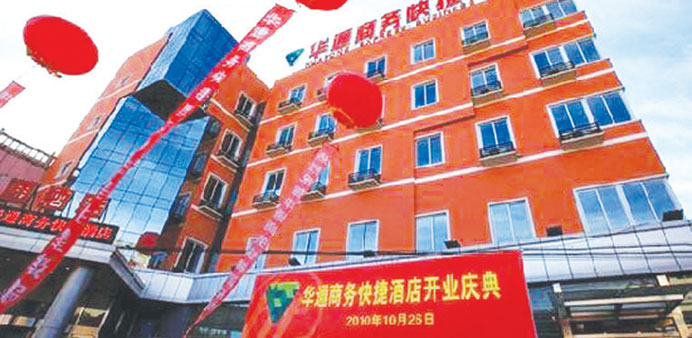The troubled Chinese construction company Huatong avoided a landmark bond default at the last minute yesterday, raising enough funds to pay off both principal and interest on a $64.51mn bond, people directly involved in the matter said.
Reuters/Shanghai
A troubled Chinese construction company avoided a landmark bond default at the last minute yesterday, raising enough funds to pay off both principal and interest on a 400mn yuan ($64.51mn) bond, people directly involved in the matter told Reuters.
The people said there was aggressive fundraising by Huatong Road & Bridge Group Co, as well as collection of its accounts payable by a local government in Shanxi province, where the firm is based.
The moves let Huatong steer away from what would have been the first public default in China’s massive interbank bond market – where 94% of all Chinese bonds are issued.
No comment was immediately available from Huatong.
The people knowledgeable about the fundraising, who spoke on condition of anonymity, said that while the money deposited in an escrow account with Shanghai Clearing House would be sufficient to pay off the bondholders, the company might not make a formal announcement of the fact soon.
While Chinese bond issuers are obliged to publicly report defaults, they are not required to announce an on-time repayment, according to a Shanghai Clearing House official who declined to give her name.
On July 16, Huatong warned investors it might not be able to repay interest and principal due on a one-year bond yesterday, saying that its chairman was “assisting an official investigation”.
Danny Chen, chief credit officer at China Lianhe Ratings, which downgraded Huatong in response to that announcement, said while he could not comment absent a fresh official announcement, he expected the company to make some statement yesterday.
A bond trader at a commercial bank in Shanghai said news that Huatong had obtained enough funds to avoid default “isn’t much of a surprise to the market”.
“People had expected the local government and company to try to avoid default given the impact,” he said. “You may argue that in the long run, one day such defaults will happen, but not for now.”
Huatong chief executive Wang Guorui was publicly dismissed from Shanxi province’s Chinese People’s Political Consultative Conference (CPPCC), a political advisory body, on suspicion he broke the law, according to a statement posted on the provincial government’s website on July 10.
If Huatong defaulted, it would have been the first time a Chinese company defaulted on a bond principal in China.
Beijing saw its first public default in March, when Shanghai Chaori Solar Energy Science and Technology Co failed to make interest payments on a bond traded on the Shenzhen stock exchange. Subsequently, many companies have gone to the brink of defaulting only to see local governments spring to provide support.
Huatong’s fundraising effort was aided by the bond’s primary underwriters, China Guangfa Bank and Guotai Junan Securities, which sent teams to Huatong to ensure information disclosure and facilitate recovery.
Bond analysts said that while yields on Huatong’s bond last week surged to nearly 15% from 6%, the market priced in a delay in payment, not a permanent default, as Huatong largely appeared to have short-term liquidity problems.
Huatong had previously told media it expected strong support from the local government in rounding up overdue accounts receivable and in delaying collection of outstanding loans coming due.
Analysts said many receivables involved other local government bodies that had hired Huatong to build real estate projects, then delayed payment due to their own financial difficulties.
The analysts also said avoidance of a default is unlikely to reassure China’s fixed income markets, which have seen steadily rising rates for short-term debt as demands from cash-strapped companies for money continue.
“No market can sustain a status quo of no-defaults,” a trader at an Asian bank in Shanghai said. “Chinese authorities will find one day that they cannot support all money-losing companies.”

